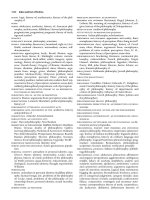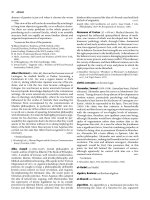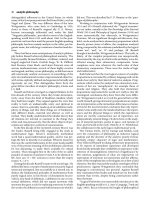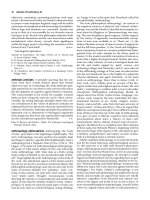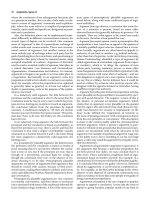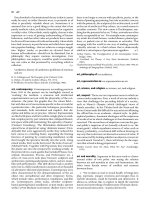The Oxford Companion to Philosophy Part 1 pot
Bạn đang xem bản rút gọn của tài liệu. Xem và tải ngay bản đầy đủ của tài liệu tại đây (368.24 KB, 10 trang )
The Oxford Companion to
Philosophy
This page intentionally left blank
The Oxford Companion to
Philosophy
Second Edition
Edited by Ted Honderich
3
3
Great Clarendon Street, Oxford ox2 6dp
Oxford University Press is a department of the University of Oxford.
It furthers the University’s objective of excellence in research, scholarship,
and education by publishing worldwide in
Oxford New York
Auckland Cape Town Dar es Salaam Hong Kong Karachi
Kuala Lumpur Madrid Melbourne Mexico City Nairobi
New Delhi Shanghai Taipei Toronto
With offices in
Argentina Austria Brazil Chile Czech Republic France Greece
Guatemala Hungary Italy Japan South Korea Poland Portugal
Singapore Switzerland Thailand Turkey Ukraine Vietnam
Oxford is a registered trade mark of Oxford University Press
in the UK and in certain other countries
Published in the United States
by Oxford University Press Inc., New York
© Oxford University Press 1995, 2005
The moral rights of the author have been asserted
Database right Oxford University Press (maker)
First edition 1995
New edition 2005
All rights reserved. No part of this publication may be reproduced,
stored in a retrieval system, or transmitted, in any form or by any means,
without the prior permission in writing of Oxford University Press,
or as expressly permitted by law, or under terms agreed with the appropriate
reprographics rights organization. Enquiries concerning reproduction
outside the scope of the above should be sent to the Rights Department,
Oxford University Press, at the address above
You must not circulate this book in any other binding or cover
and you must impose this same condition on any acquirer
British Library Cataloguing in Publication Data
Data available
Library of Congress Cataloging in Publication Data
The Oxford companion to philosophy / edited by Ted Honderich.
Includes bibliographical references and index.
1. Philosophy—Encyclopedias. I. Honderich, Ted.
B51.094 1995 100—dc20 94–36914
ISBN 0–19–926479–1
10987654321
Typeset in Dante by
Jayvee, Trivandrum, India
Printed in Great Britain
on acid-free paper by
Biddles Ltd,
King’s Lynn, Norfolk
To Bee, Ingrid, John, Kiaran, and Rina, with love
This page intentionally left blank
Preface
The brave, large aim of this book has been to bring philosophy together
between two covers better than ever before. That is not a job for one man, or
one woman, or a few, or a team, although it is tried often enough. So 249 of us
joined forces joined forces ten years ago for the first edition. We have now been
reinforced by forty-two more contributors for this second edition. To the 1,932
entries in the first edition, about 300 more have been added. Also, many of the
entries in the first edition have been considerably lengthened and revised. Many
others have been updated. The list of contemporary philosophers in the first
edition has been adjusted in order to reflect what McTaggart denied, that time
is real.
The philosophy brought together includes, first of all, the work of the great
philosophers. As that term is commonly used, there are perhaps twenty of
them. By anyone’s reckoning, this pantheon of philosophy includes Plato, Aris-
totle, Aquinas, Hobbes, Descartes, Spinoza, Leibniz, Locke, Berkeley, the
blessed Hume, Kant, Hegel, and Nietzsche. These, together with others who
stand a bit less solidly in the pantheon, are the subjects of long essays in this
book.
Philosophy as this book conceives it, secondly, includes all of its history in the
English language, a history mainly of British and American thinkers. In this his-
tory there are many figures not so monumental as Locke, Berkeley, and Hume.
Among them, if they are not admitted to the pantheon, are John Stuart Mill,
Charles Sanders Peirce, Bertrand Russell, and, if an Austrian can be counted in
this particular history, and should be, Ludwig Wittgenstein. They also include
Jonathan Edwards, Thomas Reid, William James, and F. H. Bradley.
Thirdly, if the book cannot include all of the histories of philosophy in lan-
guages other than English, it does attend to them. It attends to more than the
great leaders of the philosophies in these languages. Thus Descartes is joined by
such of his countrymen and countrywomen as Simone de Beauvoir, Henri
Bergson, and Auguste Comte. Kant and Hegel are joined by J. G. Fichte, Jürgen
Habermas, Karl Jaspers, and others. There are also general entries on each of
the national philosophies, from Australian to Croatian to Japanese to Russian.
A fourth part of the book, not an insignificant one, consists in about 150 entries
on contemporary philosophers, the largest groups being American and British. It
would have been an omission to leave out contemporaries, and faint-hearted.
Philosophy thrives. Its past must not be allowed to exclude its present. It is true,
too, that one of these contemporaries may one day stand in the pantheon.
What has now been said of four subject-matters within philosophy as the
book conceives it can be said differently. These subject-matters can be regarded
less in terms of individual thinkers and more in terms of ideas, arguments, the-
ories, doctrines, world-views, schools, movements, and traditions. This con-
tributes to another characterization of the book, more complete and at least as
enlightening, perhaps more enlightening. In particular, it brings out more of
the great extent to which the book is about contemporary philosophy rather
than the subject’s history.
There are perhaps a dozen established parts of philosophy: epistemology,
metaphysics, moral philosophy, political philosophy, philosophical logic, logic,
the philosophy of mind, aesthetics, and so on. In the case of each of these, the
book contains a long essay on its history and another on its problems as they
now are, by contributors not at all new to them.
In the case of each of these established parts of philosophy, more light is shed
by very many additional entries—for a start, by the aforementioned entries on
the great philosophers, on their lesser companions in English-language history
and other-language histories, and on contemporaries now carrying on the
struggle.
In the case of each of the established parts of philosophy, there are also very
many subordinate entries not about individual philosophers. They are quite as
important and perhaps take up more of the book. They range from shorter
essays down to definitions. To glance at subordinate entries just in the philoso-
phy of mind, the two long essays go with such shorter entries as actions, animal-
ism in personal identity, anomalous monism, body, Brentano, bundle theory of the self,
cognitive architecture, cognitive science, and determinism, double-mindedness, dual-
ism, and duck-rabbit. That is but a very small start on the philosophy of mind.
I have now said something of the philosophy which it is the aim of the 2,230
entries of this book to bring into clear view. But whose clear view? The book is
for all those who want authoritative enlightenment, judgement by good
judges. Thus it is directed partly to general readers for whom philosophy has a
fascination greater than, or at least as great as, any other part of our intellectual
and cultural existence, and who want accounts of it that they can trust. The
book is also directed to those who study and practise the subject, and are
scrupulous about their guides. If it did not also have the second aim, it could not
have the first. No accounts of a subject can be authoritative for the general
reader if they do not also attract and aim to survive the scrutiny of its experts.
If that is one description of the two classes of intended readers of this book,
there is another quite as important. There are different ways of reading. The
general readers and the experts can be taken together and then divided into two
other classes of readers. The first class has in it readers who are on the job, the
second those who are not. Not even your most conscientious postgraduate, or
your academic of truly careerist inclination, or your zealous autodidact, is
always attending to duty. Reading is not always work. Fortunately, it is more
often not work. It is not done to get answers to pre-existing questions, to pass
exams or write essays, to get promoted to full Professor. It is not done out of a
stern determination to become informed, to pursue truth. To read is often to
browse, dally, and meander. It is to satisfy curiosity, or a curiosity owed just to
a page that falls open. It is to be intrigued by the sight of affirming the consequent,
viii Preface
agglomeration, American philosophy today, arthritis in the thigh, Baudrillard, beati-
tude’s kiss,closure,feminist philosophy of science,quantum logic,slime, slingshot argu-
ments, tarot, tarwater, Thrasymachus, vague objects, or the new Wittgenstein.
A Companion, then, in what there is excuse to call the correct sense of that
sometimes abused word, is not only a book for diligent readers, to be studied
and perhaps laboured over. It is not only a complete reference book. It is more
amiable than that. It diverts. It suits a Sunday morning. Hence, not all that is in
it was chosen by the high principle of nose to the grindstone. There are entries
in it, as already noticed, that are owed to their intrinsic interest rather than their
proven place in a sterner editor’s list of headwords.
Only three things remain to be said in this Preface, the first of them about the
nature of philosophy and hence of the book. Isaiah Berlin, one of the contribu-
tors, once characterized philosophy not only as lacking answers to many ques-
tions but also as lacking an agreed method for the finding of answers. (He may
have had in mind a contrast with science, perhaps a contrast not dear, albeit for
different reasons, to a fellow contributor or two, say Paul Feyerabend or W. V.
Quine.) Certainly it is true that philosophy, no doubt because of the peculiar dif-
ficulty of its questions, is at least as much given to disagreement and dispute as
any other kind of inquiry. In fact it may be more given to disagreement and dis-
pute than any other inquiry. It has the hardest questions.
As a result, this book cannot be wholly consistent. Even with fewer than 291
contributors, if they were as committed to their views as philosophers usually
are, and no doubt should be, there would be disagreement. There would be dis-
agreement if the book was limited to the thirty-four Oxford philosophers in it,
or, say, the various Californians. As it is, there are entries, occasionally cheek by
jowl, that fight among themselves, or at any rate jostle. As an editor, I have not
tried too hard to subdue or get between my colleagues, but only succumbed to
a thought or two about unlikely philosophical propositions. (Nor have I bullied my
colleagues about what sort of thing to put into the bibliographies at the ends of
their entries, or ruthlessly excluded an entry whose subject is also treated,
somewhat differently, somewhere else.) To do so would have produced more
decorum but less truth about philosophy. It would also have touched what I
hope is another recommendation of the book: it has not only different views
but different voices in it.
That brings to mind a second matter, that of the 150 contemporary philoso-
phers on whom there are entries in the book. The aim was to give to the reader,
mainly the general reader, a sense of the philosophical enterprise as it is now
being carried forward. (Philosophy, as already remarked, is not a dead or dying
subject, but one whose vigour—I am tempted to say its youth—is as great as
ever it has been. It is only the sciences and the superstitions that come and go.)
Another editor, quite as sane, would have looked around at his cohorts, con-
templated a reputation or two, no doubt mused on the fact of philosophical
fashion, and chosen somewhat differently.
For the first edition, a list of contemporaries was initially drawn up mainly by
me. The list was subsequently the subject of a kindly suggestion or two from
possible contributors to the book who laid eye on it, and perhaps a letter or two
of hurt pride or disbelief. Notice was taken of these pleas, in a certain way. The
initial list of contemporaries was submitted to a jury of a dozen distinguished
Preface ix
